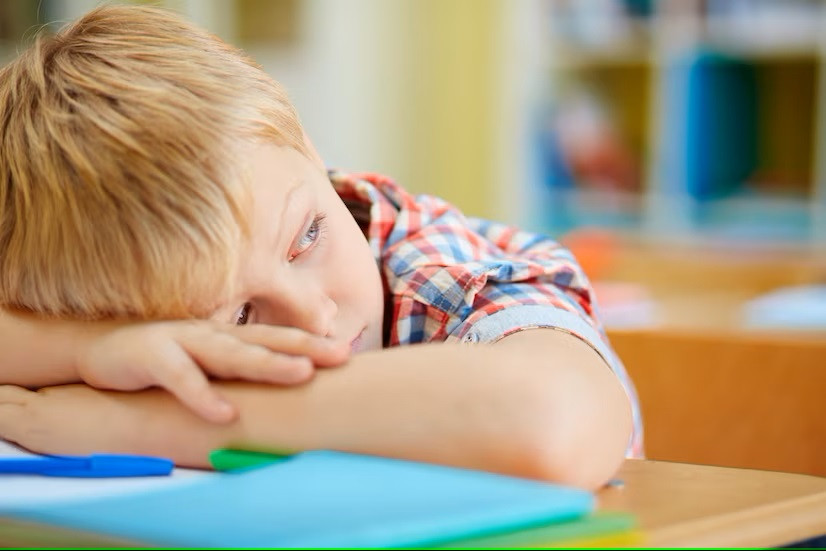Merupakan hal yang normal ketika anak kelelahan setelah menjalani aktivitas berat atau tidur terlalu malam. Dengan mencukupi tidur mereka akan kembali fit dan bersemangat seperti semula.
Namun, bila anak terlihat selalu kelelahan, rewel, tidak berenergi dan mengeluh terus-menerus, maka orang tua perlu mewaspadai kondisi yang lebih serius.
Penyebab Anak Sering Terlihat Kelelahan
Ada beberapa kondisi kesehatan yang dapat menyebabkan anak sering terlihat kelelahan, di antaranya:
Gangguan tidur
Tidak hanya karena begadang atau tidur terlalu malam yang dapat menyebabkan anak kelelahan. Sering terbangun di tengah tidur dan juga sleep apnea dapat menyebabkan anak kelelahan.
Sleep apnea merupakan gangguan pernapasan tersering yang terjadi saat tidur. Saat mengalami sleep apnea pernapasan akan terhenti sementara selama beberapa detik saat tidur sehingga dapat mengganggu kualitas tidur.
Tidak hanya terlihat kelelahan, sleep apnea dapat memengaruhi perilaku, perkembangan, metabolisme dan kesehatan anak secara keseluruhan.
Anemia
Anemia merupakan kondisi yang cukup sering dialami anak-anak. Anemia pada anak bisa disebabkan oleh berbagai hal, di antaranya:
- Kekurangan zat besi
- Kekurangan asam folat atau vitamin B-12
- Sel darah merah yang abnormal
- Kegagalan sumsum tulang belakang untuk memproduksi sel darah merah
- Infeksi
- Kehilangan darah karena cedera atau perdarahan
Selain kelelahan, anak-anak dengan anemia terlihat pucat, sering merasa pusing, sakit kepala, rewel, dan gangguan pada pertumbuhan dan perkembangannya.
Baca Juga: Anemia Sel Sabit, Jenis Anemia yang Diturunkan Secara Genetik dan Tidak Ada Obatnya
Hipotiroidisme
Hipotiroid atau hipotiroidisme adalah kelainan endokrin di mana kelenjar tiroid anak tidak menghasilkan cukup hormon tiroid. Anak yang kekurangan hormon tiroid cenderung kurang aktif, sering merasa kelelahan, mengalami penambahan berat badan, sembelit, denyut nadi lemah, dan kram otot.
Masalah jantung
Anak-anak yang mengalami masalah jantung umumnya mendapatkannya sejak lahir. Ini merupakan kelainan bawaan yang kerap disertai gejala lain seperti kelelahan, berkeringat, kesulitan makan, napas tidak teratur, denyut jantung tidak teratur, kesulitan menaikkan berat badan, bibir, lidah atau kuku sering terlihat kebiruan.
Asma
Asma pada anak adalah penyakit paru jangka panjang (kronis) yang menyebabkan saluran napas anak Anda menjadi sensitif terhadap hal tertentu (pencetus). Pemicunya bisa beragam, antara lain alergi (serbuk sari, debu, bulu hewan), infeksi pernapasan, terpapar polusi udara, dan perubahan cuaca.
Asma pada anak-anak disertai gejala seperti mengi, sesak napas, kelelahan, dan batuk.
Depresi
Depresi pada anak bukanlah hal yang tidak mungkin terjadi. Ada banyak hal yang dapat menyebabkan anak mengalami depresi, seperti trauma, kondisi keluarga, kesehatan fisik, dan lain sebagainya.
Depresi pada anak sering disertai dengan gejala di antaranya:
- Kelelahan
- Tidak berenergi
- Kurang tidur atau tidur berlebihan
- Menarik diri
- Mudah marah
- Sering merasa sedih dan mudah putus asa
- Sulit berkonsentrasi
- Selalu merasa bersalah
- Menangis berlebihan
- Berpikir untuk menyakiti diri
Baca Juga: Apa yang Sebaiknya Dilakukan Orang Tua Saat Anak Depresi?
Kapan Perlu Membawa Anak ke Dokter?
Anda perlu membawa anak ke dokter bila anak terus-menerus terlihat kelelahan lebih dari 1-2 minggu lamanya. Catat semua gejala lain yang menyertai, riwayat kesehatan keluarga, pola tidur, pola makan dan berat badan serta pertumbuhannya.
Dokter mungkin merekomendasikan tes dan pemeriksaan seperti tes darah, tes urine, rontgen atau bahkan MRI sesuai dengan kecurigaan terhadap kondisi tertentu. Jika kelelahan pada anak terkait dengan depresi, maka Anda perlu membawa anak mengunjungi psikolog atau psikiater.
Anda juga bisa berkonsultasi dengan dokter melalui aplikasi Ai Care terkait kelelahan yang dialami anak.
Mau tahu informasi seputar kehamilan, menyusui, kesehatan wanita dan anak-anak? Cek di sini, ya!
- dr Nadia Opmalina
Claire McCarthy, MD (2020). A tired child? What you should know. Available from: https://www.health.harvard.edu/blog/a-tired-child-heres-what-to-think-about-2018041713672
Kathryn Gouthro and Jennifer M. Slowik (2022). Pediatric Obstructive Sleep Apnea. Available from: https://www.ncbi.nlm.nih.gov/books/NBK557610/
Cedars Sinai. Anemia in Children. Available from: https://www.cedars-sinai.org/health-library/diseases-and-conditions---pediatrics/a/anemia-in-children.html
Children's Hospital of Philadelphia. Hypothyroidism in Children. Available from: https://www.chop.edu/conditions-diseases/hypothyroidism
Children's Healthcare of Atlanta. Heart Disease Affects Children and teens Too. Available from: https://www.choa.org/parent-resources/heart/signs-of-heart-problems-in-children-and-teens
Mayo Clinic (2023). Childhood asthma. Available from: https://www.mayoclinic.org/diseases-conditions/childhood-asthma/symptoms-causes/syc-20351507
WebMD (2022). Depression in Children. Available from: https://www.webmd.com/depression/guide/depression-children












